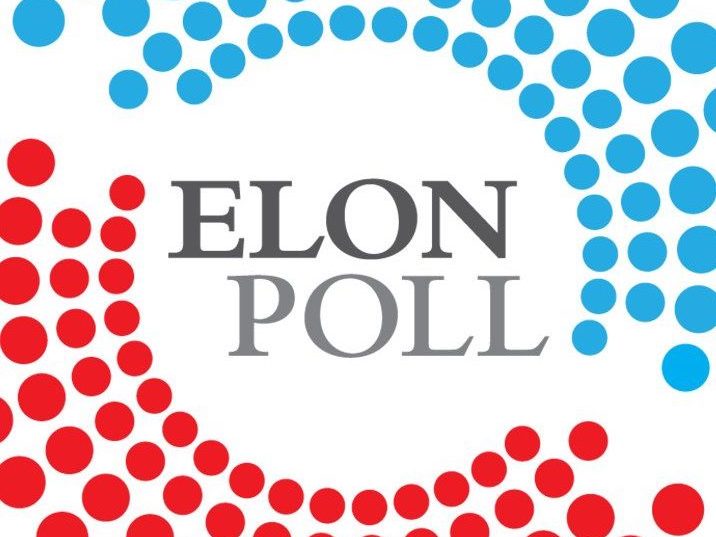The latest Elon University Poll finds dissatisfaction with the work of the Federal Emergency Management Agency and many respondents say they expect rebuilding efforts to take many years.
North Carolinians are not happy with the progress in recovering from Hurricane Helene damage in the state, according to the latest Elon University Poll.
Most adults (69%) said they are very aware or somewhat aware of the recovery process, and 46% said they were very or somewhat unsatisfied with the progress. A smaller number (37%) said they were very or somewhat satisfied with the progress.
Those are among the findings of a survey conducted March 3-11, 2025, which gathered opinions from a representative sample of 800 North Carolina adults and has a margin of error of +/- 4.04%.
- Elon University Poll topline for North Carolina state issues (March 2025)
- Elon University Poll charts and analysis for North Carolina state issues (March 2025)
The Hurricane recovery response by federal, state and local agencies was rated as very poor or poor by 39% of poll respondents, with only 26% saying the response has been good or very good.
Many more Republicans (58%) were dissatisfied with the hurricane recovery progress than Democrats (36%). Among North Carolinians aged 45 and older, 54% were unsatisfied with the hurricane recovery, compared with 35% of those aged 18-44.
Specifically asked to evaluate the work of the Federal Emergency Management Agency (FEMA), the largest group (43%) said the agency’s response has been very poor or poor, with 18% calling the work adequate and 25% saying the work has been good or very good.
In line with those poor reviews, 39% agreed with an idea proposed by President Donald Trump to eliminate FEMA and provide natural disaster relief funding directly to states. A smaller percentage (36%) opposed doing away with FEMA and 25% were unsure. The two major political parties were on opposite end of the question, with 73% of Republicans supporting elimination of FEMA and 72% of Democrats opposing that action.
North Carolinians expect many years of work ahead to recover from the hurricane, with 35% expecting full recovery to take 3-5 years, 24% expecting recovery to take 5-10 years and 14% expecting recovery to take longer than 10 years.
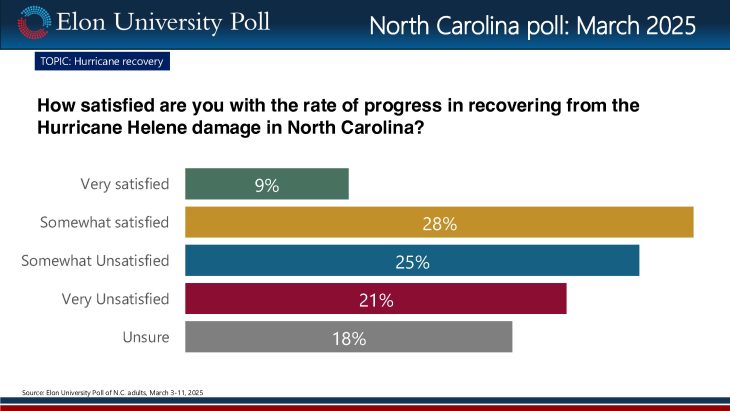
Governor Stein approval
New North Carolina Governor Josh Stein received positive numbers in his first approval rating by the Elon University Poll. Stein’s performance was approved by 44% and disapproved by 17%, with 39% unsure. Stein’s approval numbers were positive across all demographics, with a 67% approval-8% disapproval margin among Democrats, 30% approval-15% disapproval margin among Independents and a 30% approval-28% disapproval margin among Republicans.
There is much more uncertainty about Stein’s job performance, in comparison to Elon University Poll approval ratings for Gov. Roy Cooper in April 2017. Cooper had a higher approval rating (48% vs. 44% for Stein), but also a higher disapproval rating (29% vs. 17% for Stein). In those first few months of Cooper’s term, 23% said they were unsure about his performance, compared with 39% who are unsure about Stein’s performance. In April 2013, Gov. Pat McCrory had 46% approval compared to 25% disapproval.
“During all three most recent North Carolina gubernatorial transitions the Elon University Poll has found that incoming governors have enjoyed a robust honeymoon period in terms of public attitudes,” said Jason Husser, director of the Elon University Poll. “One notable distinction of the current moment is that we are finding a lower level of early disapproval for Governor Stein (17%) compared to what we found for Governors Cooper and McCrory (29% and 25%, respectively). I attribute this to a combination of Stein’s party lacking a majority to push controversial legislation through the General Assembly and the collapse of the 2024 Republican gubernatorial campaign.”
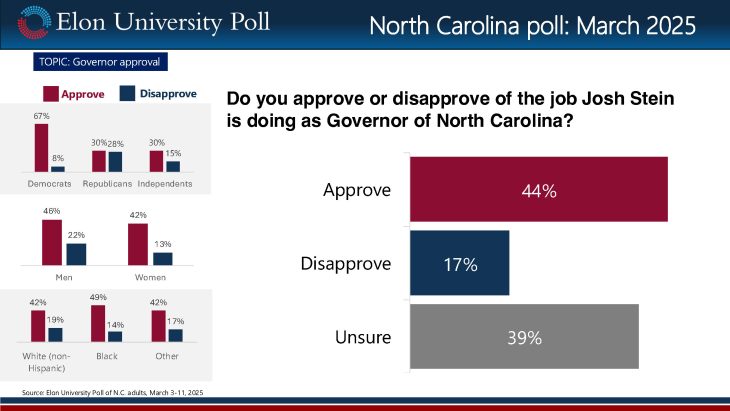
Trust in the North Carolina Supreme Court
There has been considerable debate about the North Carolina Supreme Court because of the contested election battle between incumbent Justice Allison Riggs (D) and N.C. Court of Appeals Judge Jefferson Griffin (R). Griffin lost to Riggs by 734 votes and has filed a lawsuit asking for more than 60,000 ballots to be invalidated on technical grounds. North Carolina appeals court judges held a hearing on the issues March 21.
Over 200 former judges and attorneys have signed a letter calling on Griffin to drop his lawsuit because it constitutes “a threat to the public’s faith in our judicial system.” The letter went on to say that, “although we elect jurists in our state under a partisan banner, we must guard the people’s confidence that the jurists we elect apply the law without partisan preference.”
In reflecting on their confidence in the North Carolina Supreme Court, only 8% of poll respondents said they have a lot of confidence in the court, with 36% saying they have some confidence, 35% saying they have not much or no confidence in the court and 21% are unsure.
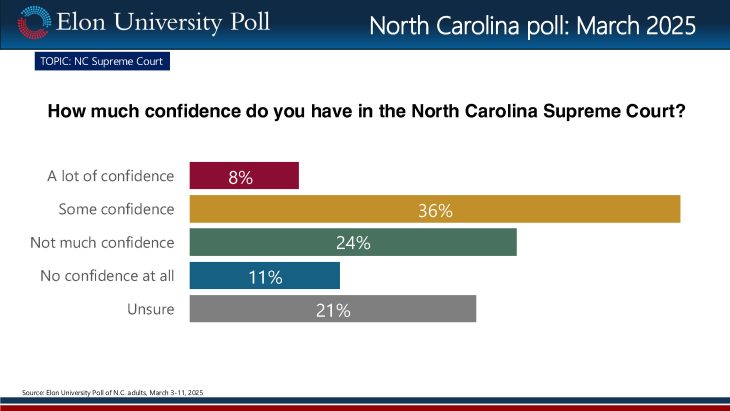
Fort Bragg name change
The recent name change of the U.S. military base near Fayetteville, North Carolina, from Fort Liberty back to its previous name, Fort Bragg, received support from 52% of poll respondents, with only 19% opposing the change and 30% saying they were unsure. The strongest support for returning the Fort Bragg name was among Republicans (81%) and those aged 45 and older (62%).
When Secretary of Defense Pete Hegseth announced the change on February 10, 2025, he said that the new Fort Bragg name honors World War II Private First Class Roland L. Bragg (1923-1999) of Maine, who was briefly stationed at the base and earned the Silver Star and Purple Heart for his exceptional courage during the Battle of the Bulge. The previous name honored North Carolina native and Confederate Army General Braxton Bragg (1817-1876). He was a controversial military leader and slave holder who graduated from the U.S. Military Academy at West Point.
In this poll, 39% said they preferred that the Fort Bragg name be designated to honor Confederate General Bragg as it did originally, while 31% preferred it be named for the World War II hero, Roland Bragg. Republicans favored the Confederate general (43%) compared with Democrats, who favored the World War II soldier (45%). White North Carolinians preferred the Confederate general by a 43% to 27% margin, while Black North Carolinians preferred the World War II soldier by a 41% to 30% margin.
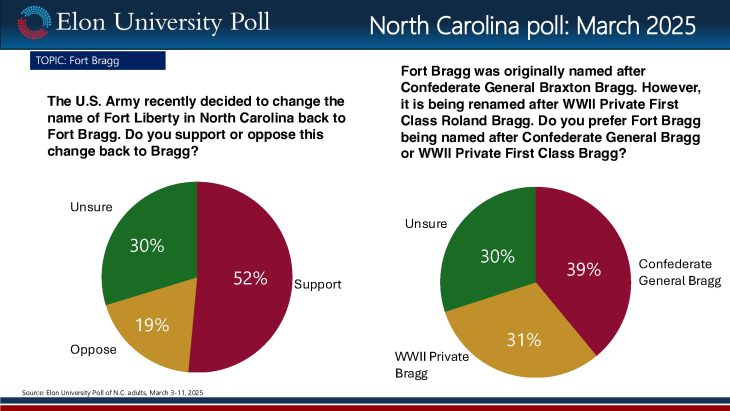
Limiting cell phone use in schools
Laws limiting cell phone use in K-12 schools are being considered across the country, including in North Carolina. In this poll, 59% of North Carolinians favor prohibiting students from using cell phones during instructional time, while 25% believe student cell phone use should be prohibited the entire school day. Only 10% said there should be no prohibition on cell phones in schools.
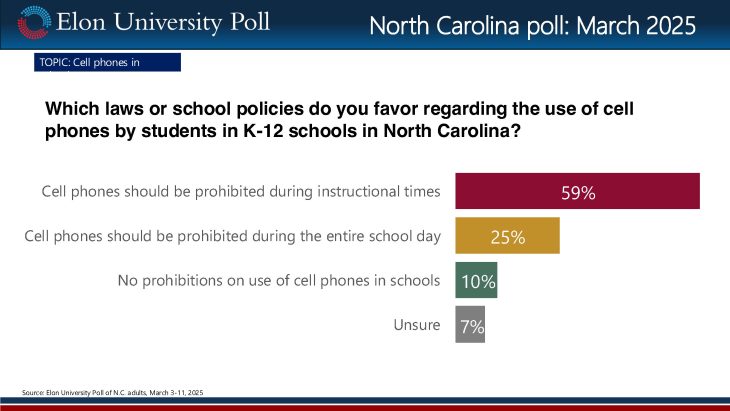
Dropping concealed handgun permits
There is strong opposition to legislation proposed by Republicans in North Carolina’s General Assembly to remove the state’s requirement for individuals to have a permit to carry a concealed handgun. This poll found that 54% oppose dropping the concealed carry permit requirement and 34% support dropping the permit.
Opinions about tax levels in North Carolina
As the April 15 tax deadline approaches, 64% of North Carolinians say the level of individual income taxes in the state is too high, with 29% saying it’s about right and 6% saying it’s too low. Those most likely to say the income taxes are too high include 77% of Republicans and 71% of those aged 45 and older.
There are similar sentiments about sales tax levels in North Carolina, with 67% saying sales taxes are too high, 31% saying they are about right and 2% saying they are too low. Those most likely to say sales taxes are too high include 75% of Black adults, 74% of those without a four-year college degree, 73% of Republicans and Independents and 72% of those with income less than $50,000.
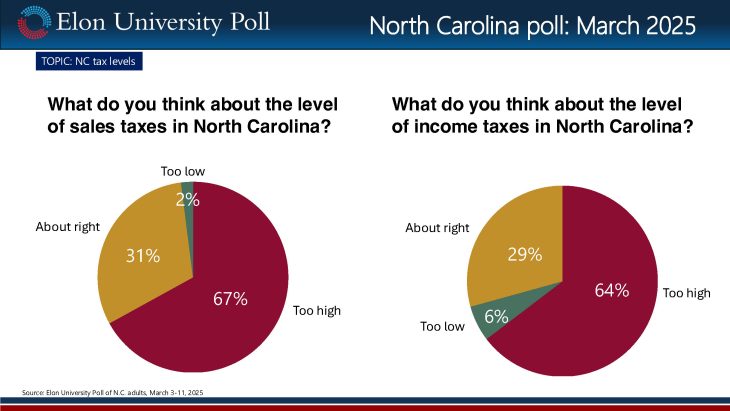
Poll Methodology
Access the poll topline and methodology at: www.elon.edu/elonpoll
The survey was constructed by the Elon University Poll in partnership with McClatchy Media Company and fielded by the international marketing and polling firm YouGov as an online, web-based survey, self-administered with online panels. Between March 3 and March 11, YouGov interviewed 1,050 North Carolina adults aged 18 and older. These respondents were then matched down to a sample of 800 to produce the final dataset. The margin of error for this poll (adjusted for weights) is +/-4.04%.



